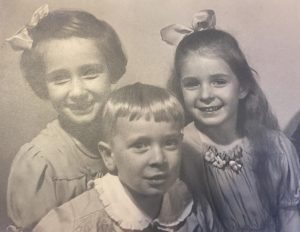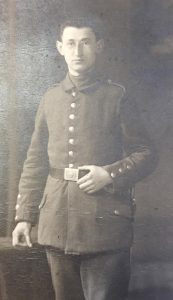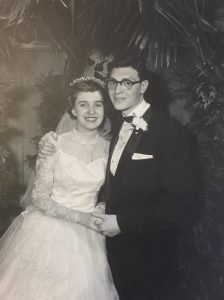Story #4 Ruth Lebowitz
 (Ruth and her siblings in Germany. L to R: Eva, Carl, and Ruth)
(Ruth and her siblings in Germany. L to R: Eva, Carl, and Ruth)
One of the first instances of antisemitic persecution that she remembers concerns something her sister reported. A first-grade student at a Hebrew day school, her sister witnessed the destruction of their synagogue. “It was a beautiful, large synagogue,” Ruth recalls, “and one day when [my sister] got there, she saw that it was burning down because the Nazis were burning it down. And she said that the walls were there but the roof was all gone.” Her sister, she told us, would never forget the way the sky looked that day. “There were books burning in the courtyard and her teacher, who was the rabbi, was being dragged down by the Nazis and he was all bloodied. It was really horrible.” After the burning of the synagogue, her sister and other children in the area had to attend school secretly in an abandoned aircraft hangar. Again, reporting her sister’s experience, Ruth said: “She had to learn how to take all kinds of different routes to school so that people wouldn’t see that kids were coming. And after a while it got too dangerous, so they had to stop going to school altogether. But again, I didn’t know any of this at the time.”
Because she did not have access to proper health care as a Jew, Ruth’s mother died of pneumonia in 1937, when Ruth was four years old. Her father, however, was soon able to leave Germany. “He had a friend who tipped him off, that his name was on the Gestapo list and that he had better get out fast,” Ruth said. “So he did. He actually bought his way out by getting forged papers.” Her father left her and her siblings in the care of a great-aunt and left for Holland, and from there to the United States. In September 1939, he was able to bring them to the U.S., just as Hitler invaded Poland.
 (Ruth’s father, Bruno Spingarn in Germany)
(Ruth’s father, Bruno Spingarn in Germany)
Ruth was only six years old when she came to America. Her father had purchased a grocery store and settled in Brockport, New York. The Lebowitz family was the only Jewish family in the town. Ruth did not experience direct antisemitism but felt like an outsider nonetheless. “We were considered alien rather than Jewish. And especially because we were from Germany, and so we were considered German rather than Jewish.” For the young Ruth, the transition to the U.S. was a difficult one. She arrived a week after the school year had begun and was trying to keep up while also learning English. “It was first grade and we were learning to read and I already knew how to read so that made things pretty easy.” After acclimating to a new life in America, Ruth went on to college in Brockport to become a teacher and later on met her husband, Jack.
 (Ruth and her husband, Jack on their wedding day)
(Ruth and her husband, Jack on their wedding day)
Holocaust education is extremely important to Ruth. When she first moved to St. Petersburg, she was surprised to learn that The Florida Holocaust Museum existed. She is thrilled, she told us, that the Museum is celebrating its twenty-fifth anniversary this year. Today, she feels an obligation to volunteer at the Museum. “Because so many of my family members that perished and so many people who died, it’s something that I really feel that I have to do.”
Story by: Katya Galfund, Karolina Perez, and Megan Weiss
Edited by: Jared Stark and Kristen Wright
